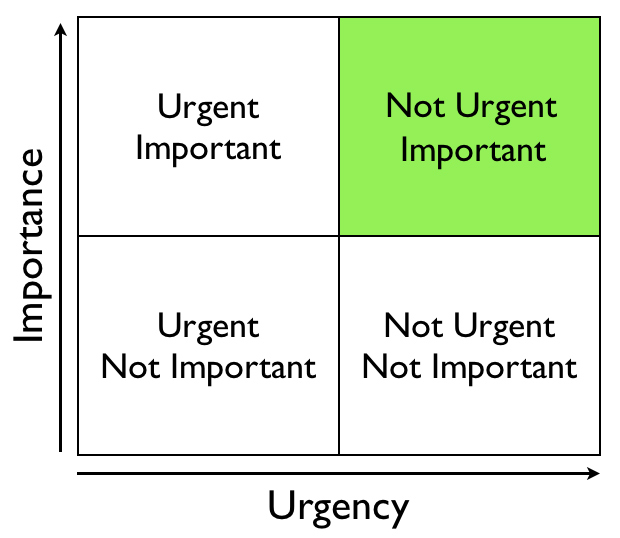Time management is difficult in any profession, but it becomes especially difficult for social media and community managers because they function primarily on external stimuli. I still struggle with time management today, but I recognize the source of it. We aim to please, rarely say no and keep people happy.
Your effectiveness decreases dramatically when you say ‘yes’ to too many requests. You get no closer to accomplishing your vision. Reality suggests that not every task you take on is worth your time or talent.
I don’t intend to give you a course (nor would I be qualified to) on time management, but there are two filters I apply when taking on new ideas. It’s specifically around tasks themselves as well as sizing up new opportunities.
This post is a part of my Social Business Explained blog series for social media professionals and community managers so they can create sustainable social businesses.
Social business requires you to be disciplined and develop a rigor in your craft. If you’re not any more scalable next year than you are today, you’re not making progress. You’re not a terrible person — you just need to say ‘yes’ to the work that matters most.

If you have read anything from Stephen Covey, you’re probably familiar with this chart. It contrasts urgency and importance of tasks and projects. It easy to confuse urgency for importance. Urgency is something that is specifically time-bound. If you have to put out fires in your job a lot, it may be because you let them linger, unextinguished for a while and they spread. Importance describes the value beyond just scratching it off your to-do list. Ideally, you want operate most of your day in the second quadrant so you can focus on the important projects without feeling pressured to complete them in a rush. If you live in the second quadrant, your results will improve because you can invest quality into them. There’s a whole book that describes this in further detail, so I won’t belabor it too much. The point is that you must get control of your projects and prioritize them; otherwise they will control you.
In addition to prioritizing your time, you need to size up opportunities that come your way. As a social business leader, you will uncover many opportunities that help you and your organization grow. Similar to the Importance-Urgency matrix pictured above, you need to measure new opportunities up accordingly.

Another way to say “Execution Time” is “effort required to complete.” New opportunities and ideas will come your way and you need to measure how they will impact your work, your business and ultimately if they fit into your vision. It extremely rare that a large business opportunity will come your way that only requires a modest effort. The dollar signs represent business impact, not necessarily cash. Opportunities that can be completed quickly usually yield modest returns. It’s up to you to decide if it’s worth the time from the business. (This is where good judgment is critical.) Should a large business idea come your way, even if it requires a ton of effort, you ought to prioritize it accordingly.
I provide you these suggestions as ways to assess new tasks, prevent scope-creep and invest in the right business ideas that result in the desired business outcomes. Social business could likely be plotted in the second quadrant in both of these charts. It’s essential, but isn’t defined by “now” when it comes to its due date.

An example you might be familiar with is restocking your refrigerator with milk. If you procrastinate, you won’t have anything to pour in your cereal. If you get milk too frequently, you will end up with unused, expired milk. When you balance the importance, urgency, execution time and business value, you’ll have a bowl of milk with your cereal every morning (and time to eat it, too).
A tactful way of saying ‘no’ is to say ‘not now’ — it’s not personal. It’s just the facts. If your manager tells you, ”Hey there, we should get on Vine because Chris Brogan raved about it,” you have the basis to decline the opportunity and stay focused on your social business’ mission. When you get your high-priority projects out of the way, go ahead and size the new idea up for a meaningful business outcome.
Think about what you do during the day. (Cue the Office Space Bobs reference here.) Do you check your CEO’s inbox for customer service matters? Pretend for a moment that you had to leave the company and think about different people who would carry out your duties. Now pretend that your company is growing and has more staff who is eager to do the work — and do it exceptionally well. I’m willing to bet that the latter is true for you. Discuss with your manager to see about unloading some duties that waste your talent and have nothing to do with your role. Delegation is powerful so you can focus on the work that matters most. It’s not due to laziness; it’s because social business requires intense focus. I’ve found that most managers have no idea about the minutia in your job; it’s up to you to make them aware of it. I have a hunch they will have more respect for you in coming forward asking for help and that you’re taking ownership of your role in the business.
Stop doing everything all yourself. Empower others.
I wish I could say it was this easy. There is a continuum of constant prioritization of new situations, but you’ll be able to tackle these more confidently and clearly with time.
Up next, I help you prepare for transforming your business into a social business by understanding the challenges you will face. It’s not for the faint of heart, so toughen up, we’ll do this together.
Photo credit: atomicshark; iko

